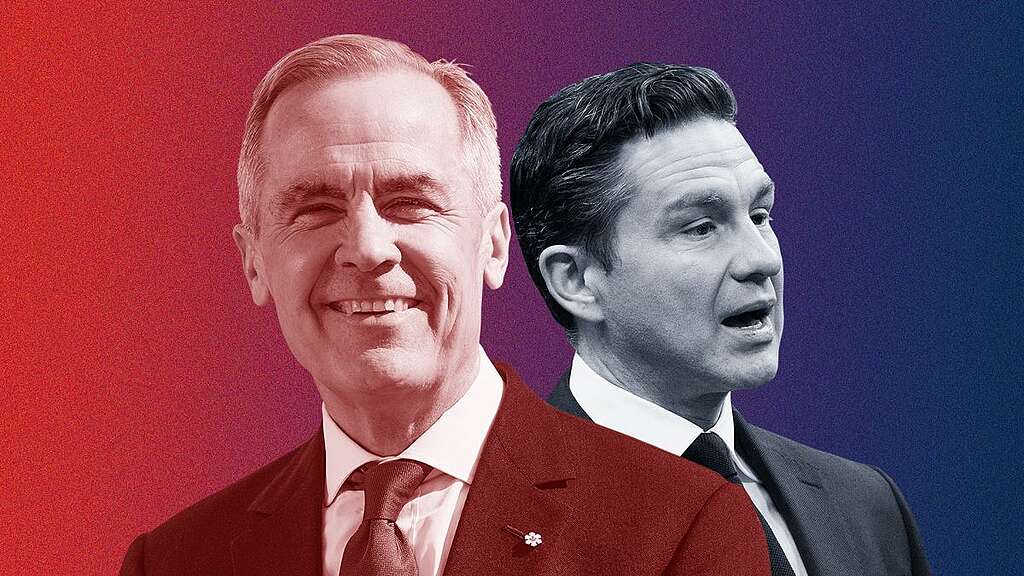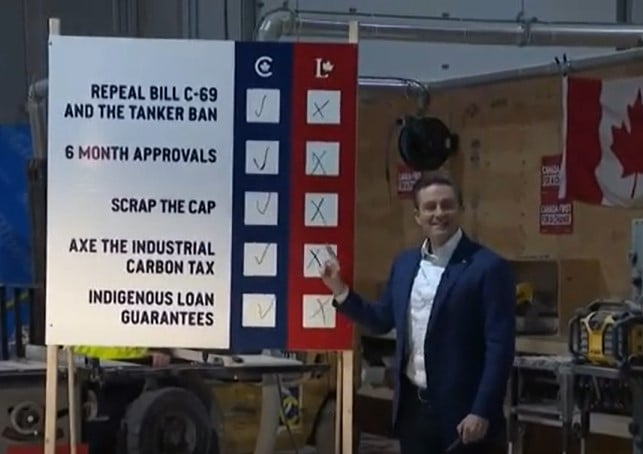
Image via lactualite.com
When Mark Carney became our Prime Minister, I asked myself: Can a former Goldman Sachs executive and central banker save Canada and the climate?
Then I realized: That’s the wrong question. To quote from the 19th century anti-slavery activist Frederick Douglass: “Power concedes nothing without a demand. It never did and it never will.”
We shouldn’t look to politicians like Mark Carney – or Conservative leader Pierre Poilievre – as top-down saviours. We should be asking: what kind of political space will there be for us as bottom-up organizers to advance our demands and win a better future?
Mark Carney is a Bay Street kind of guy, but he has a long-standing concern over climate change and there’s some interesting room to push him to be better on climate and social justice. Certainly more space than with Poilievre, given their public statements to date (see table below).
With Trump’s tariff and annexation threats suddenly dominating Canadian politics, one of Carney’s perceived assets is his experience dealing with crises. He was the Governor of the Bank of Canada during the 2008 financial crisis and Governor of the Bank of England during Brexit. He was viewed as so successful in managing the financial crash that the G20 governments asked him to look ahead and identify the source of the next potential global financial meltdown.
His answer: climate change.
He laid out his views on how climate change threatens financial securing in his September 2015 speech Breaking the Tragedy of the Horizon. In his role as the Chair of the G20’s Financial Stability Board, Carney established the Task Force on Climate-related Financial Disclosures in December 2015 and in 2019 became the United Nations’ Special Envoy on Climate Action and Finance.
His proposed response – in his previous roles as a central banker and business person – has been to support voluntary measures like better corporate disclosure of climate risks. The limitations of such voluntary approaches is evident in the recent exodus of Canadian and U.S. banks from the green banking club Carney founded, as the banks ran for cover in the face of U.S. Republican pressure. Given the role to date, it will be interesting to see how Carney deals with climate-related financial issues in his new role as a political leader. Or at least, how he responds to pressure from below on this front.
Not surprisingly, Carney has laid out a more detailed policy platform on climate change than many other issues. The table below summarizes what we know so far of his policy positions (unless otherwise indicated, it is based on his Liberal leadership campaign platform) and compares them with those of his primary rival, the Conservatives Pierre Poilievre. We’ll do more detailed comparisons with other parties’ positions once their election platforms are published. If you think anything here is inaccurate or outdated, let us know in the comments (it’s a fast-changing field).
| Issue | Mark Carney (Liberal) | Pierre Poilievre (Conservative) |
| Consumer carbon price | Cancel it. | Cancel it (Axe the Tax) |
| Consumer carbon price rebate | Replace with consumer-focused green incentives paid for by the higher industrial carbon price. | Cancel it |
| Industrial carbon price | “Improve and tighten” it, while protecting against unfair competition by introducing a Carbon Border Adjustment Mechanism” (i.e. a tax on high-carbon imports). | Poilievre has promised to eliminate the industrial carbon tax, which is the primary driver of pollution reductions in the current climate plan. |
| Integrating climate into environmental assessments of large projects | Unclear – he has hinted at support for new pipelines, but mostly talks about clean energy projects: His platform says “We will harness our vast capabilities to become a clean energy superpower, supporting projects that protect the environment while honouring the rights and prosperity of Indigenous peoples.” Commits to “Enact federal permitting reform and cut red tape to speed up approvals of clean energy projects, including new electricity developments across generation, transmission, distribution, and storage” and “Shift the focus of project review from “why” to “how” to foster an environment that prioritizes getting big, nation-building projects built.” Will require all federal regulatory authorities, including the Impact Assessment Agency, to complete reviews within 2 years (down from current 5 year limit). | Will eliminate the Impact Assessment Act (that includes climate change as an issue to be considered).As part of his commitment to support the rapid expansion of the oil and gas industry, Poilievre has promised to “clear the way for pipelines” and “to support pipelines south, north, east, west.” |
| Other aspects of the existing federal climate plan | Explicit support for Clean Growth Fund, investment tax credits, home energy retrofits and heat pumps, electric vehicle subsidies and investment in EV charging infrastructure. Unclear on whether he supports 2035 phase-out of new gas- and diesel-powered cars, net zero electricity grid or clean fuel standard. | Will eliminate the Clean Fuel Regulations (which requires oil companies to reduce the carbon content of the gasoline and diesel they sell), Clean Electricity Regulation (which mandates a ‘net zero’ electricity system by 2035) and the Electric Vehicle Availability Standards (that phases out the sale of new gas-powered cars by 2035). |
| Proposed cap on pollution from the oil and gas sector (the largest source of GHGs in Canada at nearly ⅓ of total Canadian emissions). | His Environment Minister has said it will be maintained. | Opposes the proposed cap on pollution from the oil and gas sector |
| Regulating climate finance. | Finalize and implement the sustainable finance transition taxonomy. Mandatory climate risk disclosure for large companies. | No public position, but Conservative MPs have opposed these measures at the Parliamentary Committee level. |
There is less specificity in many other policy areas, but here’s what we do know so far.
| Issue | Mark Carney (Liberal) | Pierre Poilievre (Conservative) |
| Proposed increase in capital gains tax | Cancel the increase | Cancel the increase. |
| Queer and trans rights | Unknown | Has fed the anti-trans backlash by refusing to acknowledge there are more than two genders and promising legislation to ban trans women from women’s sports, change rooms and bathrooms. |
| More to come…. |
We hope that you will consider all of the parties’ climate policies when you choose who to support in the upcoming federal election. Voting is a vital part of maintaining a healthy democracy, but it is not the only part. We also hope that you will be involved in your community and with advocacy groups (like Greenpeace!) between elections to keep the pressure on elected officials to follow through on their promises, and to push them to go further.



